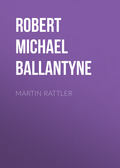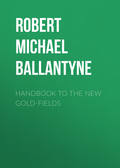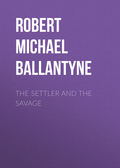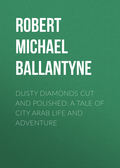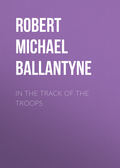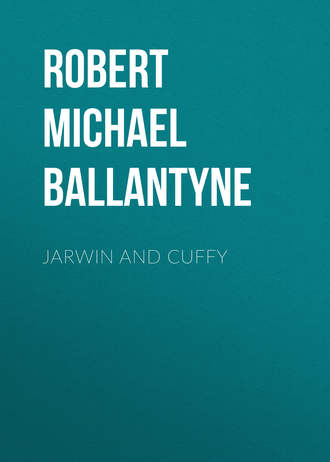
Robert Michael Ballantyne
Jarwin and Cuffy
Chapter Eight.
Despair is Followed by Surprises and Deliverance
At first John Jarwin could not quite realise his true position after leaving Raratonga. The excitement consequent on the whole affair remained for some time on his mind, causing him to feel as if it were a dream, and it was not until he had fairly landed again on Big Chief’s island, and returned to his own little hut there, and had met with Cuffy—whose demonstrations of intense delight cannot by any possibility be described—that he came fully to understand the value of the opportunity which he had let slip through his fingers.
Poor Jarwin! words fail to convey a correct idea of the depth of his despair, for now he saw clearly, as he thought, that perpetual slavery was his doom. Under the influence of the feelings that overwhelmed him he became savage.
“Cuff,” said he, on the afternoon of the day of his return, “it’s all up with you and me, old chap.”
The tone in which this was uttered was so stern that the terrier drooped its ears, lowered its tail, and looked up with an expression that was equivalent to “Don’t kick me, please don’t!”
Jarwin smiled a grim yet a pitiful smile as he looked at the dog.
“Yes, it’s all up with us,” he continued; “we shall live and die in slavery; wot a fool I was not to cut and run when I had the chance!”
The remembrance of “honour bright” flashed upon him here, but he was still savage, and therefore doggedly shut his eyes to it.
At this point a message was brought to him from Big Chief requesting his attendance in the royal hut. Jarwin turned angrily on the messenger and bid him begone in a voice of thunder, at the same time intimating, by a motion of his foot, that if he did not obey smartly, he would quicken his motions for him. The messenger vanished, and Jarwin sat down beside Cuffy—who looked excessively humble—and vented his feelings thus—
“I can’t stand it no longer Cuff. I won’t stand it! I’m goin’ to bust up, I am; so look out for squalls.”
A feeling of uncertainty as to the best method of “busting up” induced him to clutch his hair with both hands, and snort. It must not be supposed that our hero gave way to such rebellious feelings with impunity. On the contrary, his conscience pricked him to such an extent that it felt like an internal pin-cushion or hedgehog. While he was still holding fast to his locks in meditative uncertainty, three natives appeared at the entrance of his hut, and announced that they had been sent by Big Chief to take him to the royal hut by force, in case he should refuse to go peaceably.
Uttering a shout of defiance, the exasperated man sprang up and rushed at the natives, who, much too wise to await the onset, fled in three different directions. Instead of pursuing any of them, Jarwin went straight to his master’s hut, where he found him seated on a couch of native cloth. Striding up to him he clenched his fist, and holding it up in a threatening manner, exclaimed—
“Now look ’ee here, Big Chief—which it would be big thief if ’ee had yer right name—I ain’t goin’ to stand this sort o’ thing no longer. I kep’ my word to you all the time we wos at Raratonga, but now I’ll keep it no longer. I’ll do my best to cut the cable and make sail the wery first chance I gits—so I give ’ee fair warnin’.”
Big Chief made no reply for some moments, but opened his eyes with such an intense expression of unaffected amazement, that Jarwin’s wrath abated, in spite of his careful nursing of it to keep it warm.
“Jowin,” he exclaimed at length, “you Christian Breetish tar, have your dibbil got into you?”
This question effectually routed Jarwin’s anger. He knew that the savage, to whom he had spoken at various times on the subject of satanic influence, was perfectly sincere in his inquiry, as well as in his astonishment. Moreover, he himself felt surprised that Big Chief, who was noted for his readiness to resent insult, should have submitted to his angry tones and looks and threatening manner without the slightest evidence of indignation. The two men therefore stood looking at each other in silent surprise for a few moments.
“Big Chief,” said Jarwin at last, bringing his right fist down heavily into his left palm, by way of emphasis, “there’s no dibbil, as you call him, got possession o’ me. My own spirit is dibbil enough, I find, to account for all that I’ve said and done—an’ a great deal more. But it has bin hard on me to see the door open, as it were, an’ not take adwantage of it. Howsever, it’s all over now, an’ I ax yer parding. I’ll not mutiny again. You’ve been a kind feller to me, old chap—though you are a savage—an’ I ain’t on-grateful; as long as I’m your slave I’ll do my duty—‘honour bright;’ at the same time I think it fair an’ above board to let you know that I’ll make my escape from you when I git the chance. I’m bound for to sarve you while I eat your wittles, but I am free to go if I can manage it. There—you may roast me alive an’ eat me, if you like, but you can’t say, after this, that I’m sailin’ under false colours.”
During this speech a variety of expressions affected the countenance of Big Chief, but that of melancholy predominated.
“Jowin,” he said, slowly, “I like you.”
“You’re a good-hearted old buffer,” said Jarwin, grasping the Chief’s hand, and squeezing it; “to say the truth, I’m wery fond o’ yourself, but it’s nat’ral that I should like my freedom better.”
Big Chief pondered this for some time, and shook his head slowly, as if the result of his meditation was not satisfactory.
“Jowin,” he resumed, after a pause, “sing me a song.”
“Well, you are a queer codger,” said Jarwin, laughing in spite of himself; “if ever there was a man as didn’t feel up to singin’, that’s me at this moment. Howsomedever, I ’spose it must be done. Wot’ll you ’ave? ‘Ben Bolt,’ ‘Black-eyed Susan,’ ‘The Jolly Young Waterman,’ ‘Jim Crow,’ ‘There is a Happy Land,’ or the ‘Old Hundred,’ eh? Only say the word, an’ I’ll turn on the steam.”
Big Chief made no reply. As he appeared to be lost in meditation, Jarwin sat down, and in a species of desperation, began to bellow with all the strength of his lungs one of those nautical ditties with which seamen are wont to enliven the movements of the windlass or the capstan. He changed the tune several times, and at length slid gradually into a more gentle and melodious vein of song, while Big Chief listened with evident pleasure. Still there was perceptible to Jarwin a dash of sadness in his master’s countenance which he had never seen before. Wondering at this, and changing his tunes to suit his own varying moods, he gradually came to plaintive songs, and then to psalms and hymns.
At last Big Chief seemed satisfied, and bade his slave good-night.
“He’s a wonderful c’racter,” remarked Jarwin to Cuffy, as he lay down to rest that night, “a most onaccountable sort o’ man. There’s sumthin’ workin’ in ’is ’ead; tho’ wot it may be is more nor I can tell. P’raps he’s agoin’ to spiflicate me, in consikence o’ my impidence. If so, Cuff, whatever will became o’ you, my poor little doggie!”
Cuffy nestled very close to his master’s side at this point, and whined in a pitiful tone, as if he really understood the purport of his remarks. In five minutes more he was giving vent to occasional mild little whines and half barks, indicating that he was in the land of dreams, and Jarwin’s nose was creating sounds which told that its owner had reached that blessed asylum of the weary—oblivion.
Next day our sailor awakened to the consciousness of the fact that the sun was shining brightly, that paroquets were chattering gaily, that Cuffy was still sleeping soundly, and that the subjects of Big Chief were making an unusual uproar outside.
Starting up, and pulling on a pair of remarkably ancient canvas trousers, which his master had graciously permitted him to retain and wear, Jarwin looked out at the door of his hut and became aware of the fact that the whole tribe was assembled in the spot where national “palavers” were wont to be held. The “House” appeared to be engaged at the time in the discussion of some exceedingly knotty question—a sort of national education bill, or church endowment scheme—for there was great excitement, much gesticulation, and very loud talk, accompanied with not a little angry demonstration on the part of the disputants.
“Hallo! wot’s up?” inquired Jarwin of a stout savage who stood at his door armed with a club, on the head of which human teeth formed a conspicuous ornament.
“Palaver,” replied the savage.
“It’s easy to hear and see that,” replied Jarwin, “but wot is it all about?”
The savage vouchsafed no farther reply, but continued to march up and down in front of the hut.
Jarwin, therefore, essayed to quit his abode, but was stopped by the taciturn savage, who said that he must consider himself a prisoner until the palaver had come to an end. He was therefore fain to content himself with standing at his door and watching the gesticulations of the members of council.
Big Chief was there of course, and appeared to take a prominent part in the proceedings. But there were other chiefs of the tribe whose opinions had much weight, though they were inferior to him in position. At last they appeared to agree, and finally, with a loud shout, the whole band rushed off in the direction of the temple where their idols were kept.
Jarwin’s guard had manifested intense excitement during the closing scene, and when this last act took place he threw down his club, forsook his post, and followed his comrades. Of course Jarwin availed himself of the opportunity, and went to see what was being done.
To his great surprise he found that the temple was being dismantled, while the idols were carried down to the palaver-ground, if we may so call it, and thrown into a heap there with marks of indignity and contempt.
Knowing, as he did, the superstitious reverence with which the natives regarded their idols, Jarwin beheld this state of things with intense amazement, and he looked on with increasing interest, hoping, ere long, to discover some clue to the mystery, but his hopes were disappointed, for Big Chief caught sight of him and sternly ordered him back to his hut, where another guard was placed over him. This guard was more strict than the previous one had been. He would not allow his prisoner even to look on at what was taking place.
Under the circumstances, there was therefore nothing for it but to fall back on philosophic meditation and converse with Cuffy. These were rather poor resources, however, to a man who was surrounded by a tribe of excited savages. Despite his natural courage and coolness, Jarwin felt, as he said himself, “raither oncomfortable.”
Towards the afternoon things became a little more quiet, still no notice was taken of our hero save that his meals were sent to him from the Chief’s hut. He wondered at this greatly, for nothing of the kind had ever happened before, and he began to entertain vague suspicions that such treatment might possibly be the prelude to evil of some kind befalling him. He questioned his guard several times, but that functionary told him that Big Chief had bidden him refuse to hold converse with him on any subject whatever.
Being, as the reader knows, a practical, matter-of-fact sort of man, our hero at last resigned himself to his fate, whatever that might be, and beguiled the time by making many shrewd remarks and observations to Cuffy. When the afternoon meal was brought to him, he heaved a deep sigh, and apparently, with that effort flung off all his anxieties.
“Come along, Cuff,” he said in a hearty voice, sitting down to dinner, “let’s grub together an’ be thankful for small mercies, anyhow. Wotever turns up, you and I shall go halves and stick by one another to the last. Not that I have any doubts of Big Chief, Cuffy; you mustn’t suppose that; but then, you see, he ain’t the only chief in the island, and if all the rest was to go agin him, he couldn’t do much to save us.”
The dog of course replied in its usual facetious manner with eyes and tail, and sat down with its ears cocked and its head turned expectantly on one side, while the sailor removed the palm-leaf covering of the basket which contained the provisions sent to him.
“Wot have we here, Cuffy?” he said soliloquising and looking earnestly in; “let me see; bit of baked pig—good, Cuff, good; that’s the stuff to make us fat. Wot next? Roast fish—that’s not bad, Cuff—not bad, though hardly equal to the pig. Here we have a leaf full of plantains and another of yams,—excellent grub that, my doggie, nothing could be better. What’s this? Cocoanut full of its own milk—the best o’ drink; ‘it cheers’—as the old song, or the old poet says—‘but it don’t inebriate;’ that wos said in regard to tea, you know, but it holds good in respect of cocoanut milk, and it’s far better than grog, Cuffy; far better, though you can’t know nothin’ about that, but you may take my word for it; happy is the man as drinks nothin’ stronger than cocoanut milk or tea. Hallo! wot’s this—plums? Why, doggie, they’re oncommon good to us to-day. I wonder wot’s up. I say—” Jarwin paused as he drew the last dish out of the prolific basket, and looked earnestly at his dog while he laid it down, “I say, what if they should have taken it into their heads to fatten us up before killin’ us? That’s not a wery agreeable notion, is it, eh?”
Apparently Cuffy was of the same opinion, for he did not wag even the point of his tail, and there was something dubious in the glance of his eye as he waited for more.
“Well, well, it ain’t no use surmisin’,” observed the seaman, with another sigh, “wot we’ve got for to do just now is to eat our wittles an’ hope for the best. Here you are, Cuff—catch!”
Throwing a lump of baked pig to his dog, the worthy man fell to with a keen appetite, and gave himself no further anxiety as to the probable or possible events of the future.
Dinner concluded, he would fain have gone out for a ramble on the shore—as he had been wont to do in time past—but his gaoler forbade him to quit the hut. He was therefore about to console himself with a siesta, when an unexpected order came from Big Chief, requiring his immediate attendance in the royal hut. Jarwin at once obeyed the mandate, and in a few minutes stood before his master, who was seated on a raised couch, enjoying a cup of cocoanut milk.
“I have send for you,” began Big Chief with solemnity, “to have a palaver. Sit down, you Breetish tar.”
“All right, old chap,” replied Jarwin, seating himself on a stool opposite to his master. “Wot is it to be about?”
“Jowin,” rejoined Big Chief, with deepening gravity, “you’s bin well treated here.”
Big Chief spoke in broken English now, having picked it up with amazing facility from his white slave.
“Well, y–e–es, I’m free to confess that I has bin well treated—barrin’ the fact that my liberty’s bin took away; besides which, some of your black rascals ain’t quite so civil as they might be, but on the whole, I’ve been well treated; anyhow I never received nothin’ but kindness from you, old codger.”
He extended his hand frankly, and Big Chief, who had been taught the meaning of our English method of salutation, grasped it warmly and shook it with such vigour that he would certainly have discomposed Jarwin had that “Breetish tar” been a less powerful man. He performed this ceremony with the utmost sadness, however, and continued to shake his head in such a melancholy way that his white slave began to feel quite anxious about him.
“Hallo! old feller, you ain’t bin took bad, have ’ee?”
Big Chief made no reply, but continued to shake his head slowly; then, as if a sudden idea had occurred to him, he rose, and, grasping Jarwin by his whiskers with both hands, rubbed noses with him, after which he resumed his seat on the couch.
“Just so,” observed our hero with a smile, “you shake hands with me English fashion—I rub noses with you South-Sea fashion. Give an’ take; all right, old codger—‘may our friendship last for ever,’ as the old song puts it. But wot about this here palaver you spoke of? It warn’t merely to rub our beaks together that you sent for me, I fancy. Is it a song you wants, or a hymn? Only say the word, and I’m your man.”
“I s’pose,” said Big Chief, using, of course, Jarwin’s sea phraseology, only still farther broken, “you’d up ankar an’ make sail most quick if you could, eh?”
“Well, although I has a likin’ for you, old man,” replied the sailor, “I can’t but feel a sort o’ preference, d’ee see, for my own wife an’ child’n. Therefore I would cut my cable, if I had the chance.”
“Kite right, kite right,” replied Big Chief, with a deep sigh, “you say it am nat’ral. Good, good, so ’tis. Now, Jowin,” continued the savage chief, with intense earnestness, “you’s free to go when you pleases.”
“Oh, gammon!” replied Jarwin, with an unbelieving grin.
“Wot is gammon?” demanded Big Chief, with a somewhat disappointed look.
“Well, it don’t matter what it means—it’s nothin’ or nonsense, if you like—but wot do you mean, old man, ‘that’s the rub,’ as Hamblet, or some such c’racter, said to his father-in-law; you ain’t in airnest, are you?”
“Jowin,” answered the Chief, with immovable gravity, “I not onderstan’ you. Wot you mean by airnest?” He did not wait for a reply, however, but seizing Jarwin by the wrist, and looking into his eyes with an expression of child-like earnestness that effectually solemnised his white slave, continued, “Lissen, onderstan’ me. I is a Christian. My broder chiefs an’ I have watch you many days. You have always do wot is right, no matter wot trouble follers to you. You do this for love of your God, your Saviour, so you tells me. Good, I do not need much palaver. Wen de sun shines it am hot; wen not shine am cold. Wot more? Cookee missionary have say the truth. My slave have prove the truth. I love you, Jowin. I love your God. I keep you if possible, but Christian must not have slave. Go—you is free.”
“You don’t mean that, old man?” cried Jarwin, starting up with flashing eyes and seizing his master’s hand.
“You is free!” repeated Big Chief.
We need not relate all that honest John Jarwin said and did after that. Let it suffice to record his closing remarks that night to Cuffy.
“Cuff,” said he, patting the shaggy head of his humble friend, “many a strange thing crops up in this here koorious world, but it never did occur to my mind before, that while a larned man like a missionary might state the truth, the likes o’ me should have the chance an’ the power to prove it. That’s a wery koorious fact, so you an’ I shall go to sleep on it, my doggie—good-night.”
Chapter Nine.
The Last
That Jarwin’s deliverance from slavery was not a dream, but a blessed reality, was proved to him next day beyond all doubt by the singular proceedings of Big Chief and his tribe. Such of the native idols as had not been burned on the previous day were brought out, collected into a heap, and publicly burned, after which the whole tribe assembled on the palavering ground, and Big Chief made a long, earnest, and animated speech, in which he related all that he had seen of his white slave’s conduct at the island of Raratonga, and stated how that conduct had proved to him, more conclusively than anything else he had heard or seen, that the religion of the white missionaries was true.
While this was being spoken, many sage reflections were passing through Jarwin’s mind, and a feeling of solemn thankfulness filled him when he remembered how narrowly he had escaped doing inconceivable damage by giving way to temptation and breaking his word. He could not avoid perceiving that, if he had not been preserved in a course of rectitude all through his terrible trial, at a time when he thought that no one was thinking about him, not only would Big Chief and his nation have probably remained in heathen superstition, and continued to practise all the horrid and bloody rites which that superstition involved, but his own condition of slavery would, in all probability, have been continued and rendered permanent; for Big Chief and his men were numerous and powerful enough to have held their own against the Raratongans, while, at the same time, it was probable that he would have lost his master’s regard, as he would certainly have lost his respect.
He could not help reflecting, also, how much the cause of Christianity must often suffer in consequence of the conduct of many seamen, calling themselves Christians, who visit the South-Sea Islands, and lead dissolute, abandoned lives while there. Some of these, he knew, brought this discredit on the name of Jesus thoughtlessly, and would, perhaps, be solemnised and sorry if they knew the terrible results of their conduct; while others, he also knew, cared nothing for Christianity, or for anything in the world except the gratification of their own selfish desires.
While he was yet pondering these things, Big Chief advanced towards him, and, taking him by the hand, led him into the centre of the concourse. To his great surprise and confusion the tall chief said—
“Now, Jowin will palaver to you. He is one Breetish tar—one Christian. He can tell us what we shall do.”
Saying this, Big Chief sat down, and left Jarwin standing in the midst scratching his head, and looking with extreme perplexity at the vast sea of black faces and glittering eyes which were directed towards him.
“W’y, you know, old man, it ain’t fair of you, this ain’t,” he said, addressing himself to Big Chief; “you’ve took me all aback, like a white squall. How d’ee s’pose that I can tell ’ee wot to do? I ain’t a parson—no, not even a clerk, or a parish beadle!”
To this Big Chief vouchsafed no further reply than—“Palaver, you Breetish tar!”
“Wery good,” exclaimed Jarwin, turning round, and looking full at his audience, while a bright smile lit up his sunburnt countenance, as if a sudden idea had occurred to him, “I’ll do my best to palaver. Here goes, then, for a yarn.”
Jarwin spoke, of course, in the native tongue, which we translate into his own language.
“Big Chief, small chiefs, and niggers in general,” he began, with a wave of his right hand, “you’ve called on me for a speech. Good. I’m your man, I’m a ‘Breetish tar,’ as your great chief says truly—that’s a fact; an’ I’m a Christian—I hope. God knows, I’ve sometimes my own doubts as to that same; but the doubts ain’t with reference to the Almighty; they’re chiefly as regards myself. Howsever, to come to the point, you’ve gone and burnt your idols—”
“Ho!” exclaimed the whole assembly, with a degree of energy that made a deep impression on the sailor—just as one might be impressed when he has been permitted to become the happy medium of achieving some great end which he had never dreamed of being privileged to accomplish.
“Well, then,” continued Jarwin, “that is a good thing, anyhow; for it’s a disgrace to human natur’, not to speak o’ common-sense an’ other things, to worship stocks an’ stones, w’en the Bible distinctly tolls ’ee not to do it. You’ve done right in that matter; an’ glad am I to hear from Big Chief that you intend, after this, to foller the truth. Old man, an’ niggers,” cried Jarwin, warming up, “to my mind, the highest thing that a man can dewot his-self to is, the follerin’ out an’ fallin’ in with the truth. Just s’pose that chemists, an’ ingineers, an’ doctors was to foller lies! W’y, wot would come of it? Confoosion wus confounded. In coorse, therefore, they carefully tries to foller wots true—though I’m bound for to say they do git off the track now an’ then. Well, if it’s so with such like, it’s much more so with religion. Wot then? W’y, stand by your colours, through thick an’ thin. Hold on to the Bible! That’s the watchword. That’s your sheet-anchor—though you haven’t seed one yet. It’s good holdin’ ground is the Bible—it’s the only holdin’ ground. ‘How does I know that?’ says you. Well, it ain’t easy for me to give you an off-hand answer to that, any more than it is to give you an off-hand answer to a complicated question in the rule o’ three. A parson could do it, no doubt, but the likes o’ me can only show a sort o’ reflected light like the moon; nevertheless, we may show a true light—though reflected. Chiefs an’ niggers, there’s asses in every generation (young asses chiefly) as thinks they’ve found out somethin’ noo in regard to the Bible, an’ then runs it down. An’ them fellers grow old, an’ sticks to their opinions; an’ they think themselves wise, an’ other people thinks ’em wise ’cause they’re old, as if oldness made ’em wise! W’y are they asses? W’y, because they formed their opinions early in life, in opposition to men wot has studied these matters all through their lives. Havin’ hoisted their colours, they nails ’em to the mast; an’ there they are! They never goes at the investigation o’ the subject as a man investigates mathematics, or navigation, or logarithms; so they’re like a ship at sea without a chart. Niggers, no man can claim to be wise unless he can ‘render a reason.’ He may be, p’raps, but he can’t claim to be. I believe the Bible’s true because o’ two facts. Fust of all, men of the highest intellec’ have found it true, an tried it, an’ practised its teachin’s, an’ rested their souls on it. In the second place, as the parsons say, I have tried it, an’ found it true as fur as I’ve gone. I’ve sailed accordin to the chart, an’ have struck on no rocks or shoals as yet. I’ve bin wery near it; but, thank God, I wasn’t allowed to take the wrong course altogether, though I’ve got to confess that I wanted to, many a time. Now, wot does all this here come to?” demanded Jarwin, gazing round on his audience, who were intensely interested, though they did not understand much of what he said, “wot does it come to? W’y that, havin’ wisely given up yer idols, an’ taken to the true God, the next best thing you can do is to go off at once to Raratonga, an’ git the best adwice you can from those wot are trained for to give it. I can’t say no fairer than that, for, as to askin’ adwice on religious matters from the likes o’ me, w’y the thing’s parfitly ridiklous!”
Jarwin sat down amid a murmur of applause. In a few minutes an old chief rose to reply. His words were to the effect that, although there was much in their white brother’s speech beyond their understanding—which was not to be wondered at, considering that he was so learned, and they so ignorant—there was one part of it which he thoroughly agreed with, namely, that a party should be sent to Raratonga to inform the Cookee missionaries as to what had taken place, to ask advice, and to beg one of the Cookees to come and live permanently on their island, and teach them the Christian religion. Another chief followed with words and sentiments to much the same effect. Then Big Chief gave orders that the canoes for the deputation should be got ready without delay, and the meeting broke up with loud shouts and other pleasant demonstrations.
Matters having been thus satisfactorily arranged, Jarwin returned to his hut with a grateful heart, to meditate on the happy turn that had taken place in his prospects. Finding the hut not quite congenial to his frame of mind, and observing that the day was unusually fine, he resolved to ramble in the cool shades of a neighbouring wood.
“Come, Cuff, my doggie, you an’ I shall go for a walk this fine day; we’ve much to think about an’ talk over, d’ee see, which is best done in solitary places.”
Need we say that Cuffy responded with intense enthusiasm to this invitation, and that his “spanker boom” became violently demonstrative as he followed his master into the wood.
Jarwin still wore, as we have said, his old canvas trousers, which had been patched and re-patched to such an extent with native cloth, that very little of the original fabric was visible. The same may be said of his old flannel shirt, to which he clung with affectionate regard long after it had ceased to be capable of clinging to him without patchwork strengthening. The remnants of his straw hat, also, had been carefully kept together, so that, with the exception of the paint on his face, which Big Chief insisted on his wearing, and the huge South-Sea club which he carried habitually for protection, he was still a fair specimen of a British tar.
Paroquets were chattering happily; rills were trickling down the hillsides; fruit and flower trees perfumed the air, and everything looked bright and beautiful—in pleasant accordance with the state of Jarwin’s feelings—while the two friends wandered away through the woods in dreamy enjoyment of the past and present, and with hopeful anticipations in regard to the future. Jarwin said something to this effect to Cuffy, and put it to him seriously to admit the truth of what he said, which that wise dog did at once—if there be any truth in the old saying that “silence is consent.”
After wandering for several hours, they came out of the wood at a part of the coast which lay several miles distant from Big Chief’s village. Here, to his surprise and alarm, he discovered two war-canoes in the act of running on the beach. He drew back at once, and endeavoured to conceal himself, for he knew too well that this was a party from a distant island, the principal chief of which had threatened more than once to make an attack on Big Chief and his tribe. But Jarwin had been observed, and was immediately pursued and his retreat cut off by hundreds of yelling savages. Seeing this, he ran down to the beach, and, taking up a position on a narrow spit of sand, flourished his ponderous club and stood at bay. Cuffy placed himself close behind his master, and, glaring between his legs at the approaching savages, displayed all his teeth and snarled fiercely. One, who appeared to be a chief, ran straight at our hero, brandishing a club similar to his own. Jarwin had become by that time well practised in the use of his weapon; he evaded the blow dealt at him, and fetched the savage such a whack on the small of his back as he passed him, that he fell flat on the sand and lay there. Cuffy rushed at him and seized him by the throat, an act which induced another savage to launch a javelin at the dog. It grazed his back, cut it partly open, and sent him yelling into the woods. Meanwhile, Jarwin was surrounded, and, although he felled three or four of his assailants, was quickly overpowered by numbers, gagged, lashed tight to a pole, so that he could not move, and laid in the bottom of one of the war-canoes.



